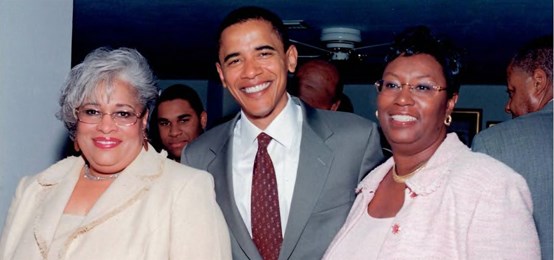MIAMI – Rachel Janie Reeves walked in a league of her own. Fearless and unapologetic about it, Reeves was the first and only woman to become publisher and CEO of her family’s iconic publication, The Miami Times.
Rachel died Thursday, September Sept. 13, at age 69 after a lengthy illness. Much like the stories she told, the impact she made on blacks locally and nationally will live on.
Born May 22, 1950, to Garth C. Reeves Sr. and Janie Henderson Reeves, Rachel grew up in Liberty City with her brother Garth Reeves Jr. After school, they would walk to the newspaper – founded by their grandfather Henry E.S. Reeves – to learn the ropes.
Upon graduating high school, Rachel attended Bennett College in North Carolina and majored in English literature. When she returned home, she worked her way up through the ranks of the newspaper’s operations to become The Miami Times’ business manager.
After her brother Garth died at age 30 and her father subsequently announced his retirement in 1992, Rachel was entrusted with the helm of her family’s legacy publication. Though not initially in the plans, Rachel took on the role with great strength and savvy.
“She was an astute businesswoman who learned the craft from her father and her grandfather, and she was a nononsense newspaperwoman – and she enjoyed it immensely,” historian Dorothy Jenkins Fields told the Miami Herald. Jenkins, founder of Black Archives, History and Research Foundation of South Florida, grew up with Rachel.
Rachel’s tenure as publisher and CEO spanned nearly three decades. During that time, she took her job of lifting-up Black stories – and holding anyone who sought to bring harm to her community accountable – seriously. As formidable as any publisher in the male-dominated media industry, it was not uncommon for Rachel to implement new ideas and hire talented individuals who were diamonds in the rough.
Michelle Hollinger (formerly Renee Harris) was one of those individuals. Having met Rachel at a career fair the Times hosted, Hollinger credits Rachel with hiring her as the paper’s first female editor despite her lack of experience.
“The thing that resonates so deeply with me about Rachel is when I went to The Miami Times, it was a career change for me and she connected with me around my passion for the community,” Hollinger said, adding Rachel was big on The Miami Times’ having an authentic connection to, and responsibility for, the community.
“We had a wonderful interview, just the two of us and she hired me on the spot. I really believe that’s a huge part of her legacy, being able to spot talent and identify people who could help her to maintain and ultimately strengthen the newspaper’s connection to the community. I will always be grateful to her because she gave me my first job in journalism,” Hollinger said.
In addition to launching the professional careers of many of Miami’s Black journalists and media professionals, Rachel was also responsible for changing the paper’s size from tabloid to broadsheet, implementing a bold and bright color scheme, implementing new features and encouraging writers to dig deeper and write critically.
Robert Beatty, publisher of the South Florida Times, was a longtime friend of Rachel’s. They were godparents to each other’s children. Beatty said in addition to her being a brilliant, trailblazing businesswoman who was “second to none,” Rachel was an intentional friend.
“Consistent with her efforts to incorporate female editors into the Miami Times, her approach with friends was to incorporate them into her life as equally and fundamentally,” Beatty said. “When I first came to town, Rachel befriended me, and her outreach became the base for a 40-year friendship. I always marveled at how voracious a reader she always was. She would borrow certain of my books because she consistently endeavored to broaden her scope of knowledge in areas that had been outside of her purview.” “She was truly a phenomenal woman of great strength and brilliance.”
Under Rachel’s leadership, The Miami Times survived when the print media industry was pummeled by the onset of digital content. Black print media outlets became even more scarce, but Rachel used her sharp business acumen to ensure her family’s legacy would abound. The Miami Times has never missed a publication date. It was a fact Rachel was extremely proud of.
“The Miami Times has never missed a paper and we’re not about to start now,” Rachel said to her staff in 2005 after Hurricane Wilma blew the office’s electricity. She ordered them to power up the generators and get to work. The resilient, go-getter attitude was typical of her.
“I ain’t laid-back at all. If something goes wrong, I want it straightened out,” Rachel once told the Miami Herald.
Another good friend of Rachel’s was Miami-Dade County Commission Chairwoman Audrey Edmonson. She released a statement speaking highly of Rachel.
“It is with heartfelt sorrow to hear of the passing of Rachel Reeves, my cherished friend and a community icon,” Edmonson said. “As the publisher and CEO of the Miami Times, she led Miami’s largest African American newspaper in the South, providing relevant news and information to the community with grace. This community mourns her passing.”
Rachel is survived by her father Garth Sr., 100, and her son Garth Basil Reeves, 29. Services will be held Thursday at 10 a.m. at St. Agnes Episcopal Church, located at 1750 NW 3 Avenue in Overtown.










No Comment